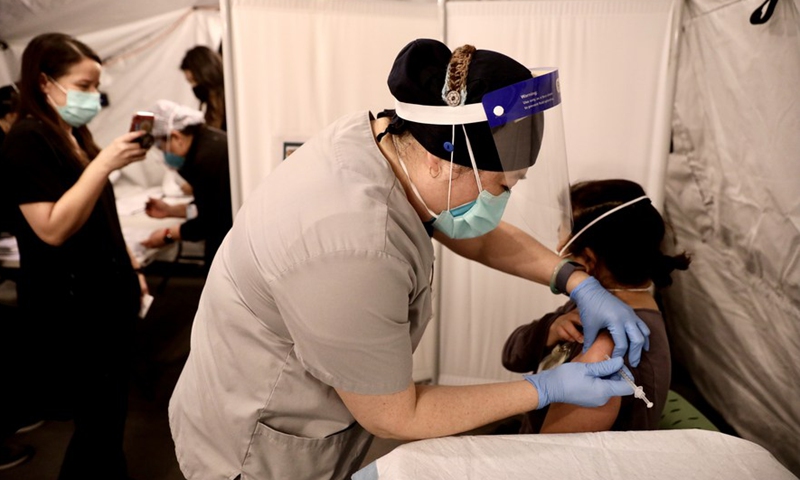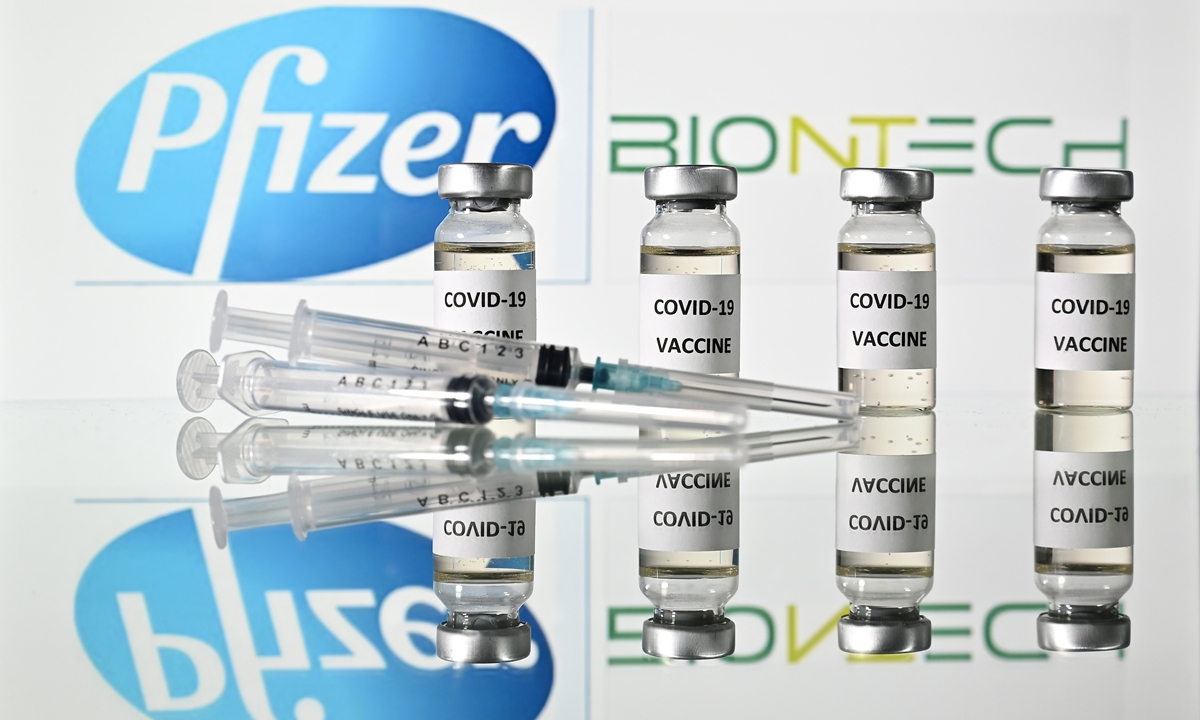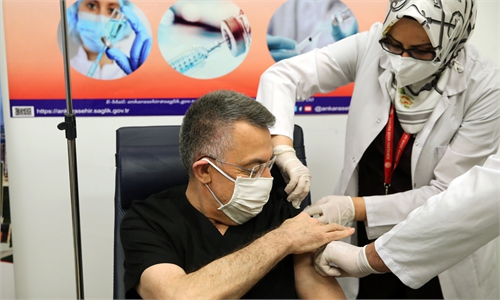
A frontline health care worker at Garfield Medical Center receives his first dose of Pfizer COVID-19 vaccine in a pop-up tent outside their main facility in Monterey Park, Los Angeles County, California, the United States, Dec. 18, 2020. (Xinhua)
US President Joe Biden rolled out his national plan to fight the COVID-19 pandemic on his first full day in office on Thursday, emphasizing an increase of vaccination supplies to meet his goal of administering 100 million shots to vaccinate 50 million Americans within 100 days. Analysts said the move, if implemented smoothly, would help control the disastrous pandemic situation in the US but may face more difficulties, including people's unwillingness to get vaccinated and problems with distribution and transportation.
By releasing a 198-page plan on the official White House website, Biden showed Americans his national anti-virus strategy and signed executive orders ramping up supplies for vaccination, testing and personal protective equipment, as well as a boost to the development of therapeutics to treat COVID-19, CNN reported.
The overall plan started with a national vaccination campaign to administer 100 million doses to 50 million Americans within 100 days.
"It is good for the US to take the fight against the coronavirus seriously, albeit this late. But Biden's vaccination plan may encounter greater resistance among Americans, considering domestic anti-vaccine campaigns," Tao Lina, a Shanghai-based medical expert on vaccines, told the Global Times.
Chen Xi, an assistant professor of public health at Yale University, told the Global Times in a previous report that people's willingness to get vaccinated, the quality of the vaccines, distribution and the US' capability for vaccine production would all be critical factors in the promotion of vaccination.
Thanks to former president Donald Trump's anti-science publicity of prevention, some Americans may be unwilling to keep social distance, wear masks or get vaccinated. Some are acting out of concerns of the vaccines' efficiency and security, while others refuse to get the dose to demonstrate their rights for "freedom," Tao said.
Recent reports on the US' Pfizer and Moderna vaccines arouse some concerns. For example, more than 12,400 people in Israel were reportedly infected with COVID-19 after accepting Pfizer's COVID-19 vaccine, which led to doubts over the vaccine's efficacy, despite the reported 95 percent efficacy in Phase III clinical trials.
Health experts also called on Norway and other countries to suspend the use of mRNA-based COVID-19 vaccines produced by companies such as Pfizer, especially among elderly people, due to the vaccines' safety uncertainties following the deaths of more than 25 elderly Norwegian people who received the vaccine.
Chen told the Global Times previously that Pfizer's clinical data did not show the available duration of the antibody made by the vaccines. He predicted that two-thirds of Americans could get vaccinated by the end of August. This number, after adding the 10 percent of the population who already have the antibody, could help to achieve herd immunity. If Biden's 100-day plan fails, the pandemic in the US may last until winter, or even 2022.
Chen on Friday said he still feels optimistic about Biden's 100-day vaccine plan since it aims to partner federal and state governments on vaccine distributions and mass vaccinations. The military would also be used to help build temporary sites to get vaccinated.
Chen noted that the third US-developed vaccine is also preparing to apply for emergency use, which could also help increase supplies.
However, Chen said that his optimism may be challenged by the virus variant found in the UK, which spreads faster. Once the super infectious strain spreads in the US, the US' current vaccine plan would be disturbed.

An illustration shows vials of a COVID-19 vaccine and syringes with the logos of US pharmaceutical company Pfizer and German partner BioNTech, released on Tuesday.Photo: AFP
Tao also believes the US still has a window to control the pandemic through mass vaccination. But thorny problems remain. "Considering the flu vaccination coverage in the US has been lower than 50 percent for years, the COVID-19 vaccination rate may be difficult to reach 50 percent."
US media reported that on Monday, Greenhouse, a marijuana dispensary in the northwestern Detroit suburb of Walled Lake, announced "Pot for Shots," a program where people who get their first dose can get a free pre-rolled joint from the store. The incident has sparked controversy.
Currently, the US is the place hit hardest by coronavirus in the world. It has reported more than 24.6 million infections with the death toll at 410,102 as of press time on Friday, according to data from Johns Hopkins University.
Aside from the above problems, errors during transportation may also hinder vaccine distribution. Both Pfizer and Moderna are mRNA vaccines require storage in facilities with strict low temperatures.
Almost 12,000 doses of COVID-19 vaccine were ruined while en-route to Michigan due to a temperature control issue, US media reported on Tuesday.

